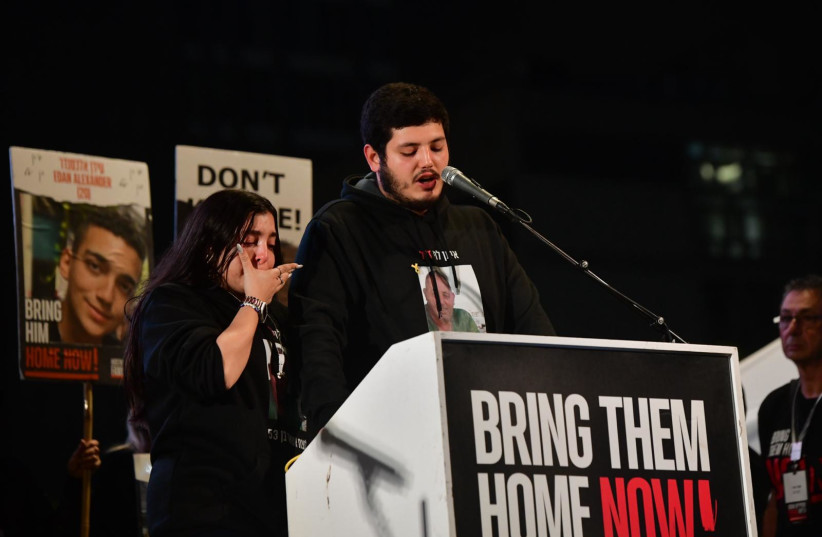An Israeli hostage freed from Gaza was sprayed by a police water cannon and an elderly man collapsed after being struck in the head by an officer riding a horse as police cracked down on anti-government protests in Tel Aviv.
Twenty-one people — including two of the protest movement’s organizers — were arrested at the protest on Saturday night over what police said was an “illegal gathering” in Democracy Square, next to the Israeli military’s headquarters.
The square gained that name last year, as weekly rallies took place there to protest the government of Benjamin Netanyahu and its efforts to sap Israel’s judiciary of its power. Those demonstrations abruptly stopped after Hamas’s attack on Israel, as leaders of the protest movement preached wartime unity, and took prominent roles in the civilian relief effort. A newly formed war cabinet suspended all non-emergency legislation, including the controversial proposed judicial reforms.
Now, with frustration over Netanyahu’s wartime leadership mounting, the demonstrations are growing again, with protesters calling for elections and a deal to free the Israeli hostages remaining in Gaza. Saturday night’s were the first since October 7 to feature police using water cannons on protesters, a regular occurrence during the prewar protests.

Justice Ministry to investigate
According to Israeli media reports, the Justice Ministry will investigate one incident, captured on video, in which a mounted officer appears to strike a man with his reins, who then falls to the ground.
Democracy Square, also known as Kaplan Square, is just blocks from Hostage Square, where family members of the Israelis held hostage in Gaza since October 7 have been demonstrating with their allies daily. Their weekly Saturday-night rally, calling for a hostage deal as Israeli negotiators participate in talks for the first time in weeks, put attendees in proximity of the police crackdown, and at least one former hostage was caught up in the violence.
Ilana Gritzewsky, who was captive in Gaza for 55 days and came to demand the release of her partner Matan Zangauker, was hit with spray from a water cannon while with Zangauker’s mother Einav during the police’s effort to disperse the anti-government rally.
“We were at a demonstration for the release of the hostages … when we arrived at the Kaplan intersection, the officer who accompanied us left us and we were left alone and got the water cannon in the face. Ilana got stressed out, we sat down on the road and then the horses came and we wanted to run away… People came who formed a circle and protected us with their bodies,” Einav Zangauker told the Israeli news site Ynet.
“I am the mother of a hostage, Ilana was in captivity for 55 days and came to sound the cry for her partner, and this is the treatment we receive?” she said.
Negotiations over a ceasefire and hostage release, which are taking place in Doha, Qatar, have reportedly made progress, as Israeli negotiators and mediators have formulated an outline that Hamas is now considering. In its initial phase, the deal would reportedly include the release of 40 hostages for a larger number of Palestinian security prisoners and a six-week pause in combat, among other provisions. About 100 Israeli hostages remain alive in Gaza, in addition to dozens who have been killed.
Netanyahu, meanwhile, has refused calls to advance the date for elections currently set for 2026, saying last week, “I don’t suggest getting involved in this during the war. We need unity right now.” Polls since October 7 show dismal approval ratings for Netanyahu and predict that his right-wing coalition would lose an early election to the centrist bloc led by National Unity leader and war cabinet member Benny Gantz. A January poll by the right-leaning Israel Hayom newspaper found that 63% of Israelis “support elections as early as possible.”
Clashes between police and protesters was a regular occurrence last year. A late-July study by Israel’s Channel 13 found that over 700 Israelis were arrested in the judicial reform protests last year, while 123 civilians and 39 police officers were wounded during the weekly protests that regularly drew more than 100,000 to Democracy Square. According to the report, the police deployed more than 45,000 officers during the 30 weeks of protest across more than 3,000 locations across Israel, using water cannons on protesters 33 times.
One of the protest leaders arrested on Saturday night, the retired air force general Amir Haskel, tweeted that he was released without charges after half an hour. Among those who spoke was the American-Israeli Tal Mitnick, who had just completed a second 30-day stint in jail for refusing to enlist in the Israeli military to protest its war on Gaza.
